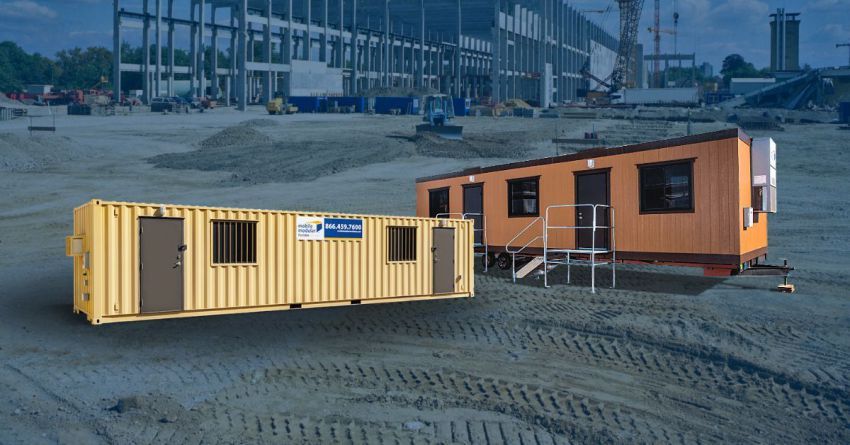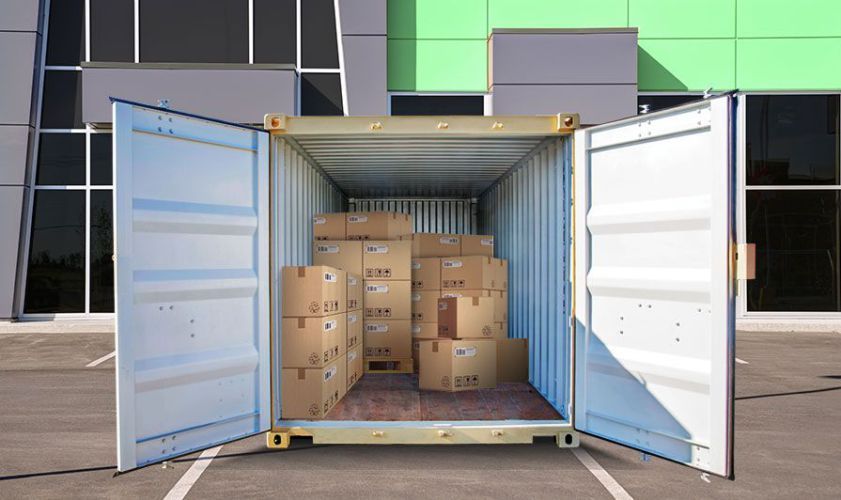- Rent, Lease, or Purchase
- |
January 28, 2021
Buying Shipping Containers - Important Factors to Consider

When buying new or used shipping containers, many questions can arise. Things like quality, cost, size, weight, and what you plan on using it for, will all be important questions that need to be answered before making a purchase.
To help you avoid any pitfalls, we've put together a comprehensive guide for buying containers so you can feel confident before your next purchase.
Whether you need a storage container to store equipment or a portable office container for a temporary office or retail space, there are many factors to consider depending on the use.
This guide explains the precautions and factors you need to look into before you buy shipping containers.
Buying Shipping Containers? Know These Risks First
Like any industry, purchasing used equipment doesn’t come without risks. Here are some key factors you will want to keep in mind when you begin shopping for used shipping containers.
Container Condition Surprises
One of the common risks is that container conditions can differ drastically from what you see in pictures. You don't want to place an order based on photos and end up with a product in a deteriorated condition. To avoid such surprises, check your container supplier's reviews online.
Paying Too Much
Before committing to buy, having a ballpark estimate of the container’s value will ensure that you do not end up paying too much with hidden fees, exorbitant delivery charges, or excessive middleman markups.
No Support or Guarantee
When you need after-sale support, the vendor should be willing to extend it to you. To err is human - you may receive a container in a condition that's worse than expected. Hence, it becomes critical to buy a shipping container from a trusted company eager to rectify the problem. Avoid suppliers with a track record of refusing to satisfy customers or declines to offer any guarantee on the container's condition.
Delivery Disasters
Besides watching for substantial delivery fees, you will also want to understand the handling of incidents where a container is damaged during transit or installation. It may result in either you keeping the damaged container or paying to replace it, based on who sold it or hired the delivery company.
Factors to Consider Before Buying Shipping Containers
Before purchasing new or used shipping containers, it pays to know the key elements that will influence whether or not you make a smart purchase decision. Here are some guidelines you should keep in mind while buying shipping containers.

Buying vs. Renting Shipping Containers
To decide if you need to rent or buy a shipping container, ask yourself the following questions:
- How long should you keep the container?
- How much does the container cost to purchase?
- How much will it cost to rent the container for that time?
How Long Should You Keep the Container?
The rule of thumb is if you need a container for more than 3 years, you should buy a shipping container. The same applies if you plan to make modifications to the container structure. If you want to keep the container for less than a year, it's best to rent one. You can always calculate and compare how much you need to spend to buy a shipping container and the amount you need to rent it for the same duration.
How Much Do Shipping Containers Cost to Purchase?
Purchase prices of a storage container vary widely based on its type, age, condition, and location. Here are some estimates to give you an idea about container purchase prices.
- New 20 ft. container - $ 3,000
- Used 20 ft. container - $ 2,100
- New 40 ft. container - $ 5,600
- Used 40 ft. container - $ 2,850
Note: Container costs can change significantly, based on where you buy them and their condition. In addition, a word of caution - make sure that you don't go cheap on a used container - you want to avoid inferior quality and hidden faults.
How Much Will It Cost to Rent a Container?

The prices for renting a container vary widely and range between $125 to $500 per month, depending on the desired container size and amenities. Remember to consider all the costs while calculating the purchase and rent costs. For instance, while purchasing a container, the purchase price is more than the sticker price, and you have to pay the delivery fees. On the other hand, while renting, there may be hidden fees in the recurring billing amount.
Condition and Grades of Shipping Containers
Your intent for the shipping container drives the type of container you should purchase or rent. Below is a list of the different grades of shipping containers and what they mean.
New or One-Trip Shipping Containers
Sometimes used interchangeably, new and one trip containers are almost the same. While new containers are brand-new ones that come from the manufacturer, a one-trip container carries a cargo load from its country of manufacture to the United States. Thus, a one-trip container is as good as a new container and guarantees great discounts compared to their brand-new counterparts.
Used Shipping Containers
Used shipping containers span from hardly used to completely used containers. Though a used shipping container should not be in a damaged condition, it has undergone general wear and tear. Used containers are generally classified into three categories.
Cargo-worthy (CW) Containers
Cargo-worthy containers are CSC (Container Safety Convention) certified a mandatory standard for containers in international transport. A cargo-worthy container practically offers the same performance as a new container. If you have plans to move your container in the future, go for a cargo-worthy container. However, if you plan for any exterior modifications such as window or door cuts, buying a cargo-worthy container is not a good idea. The modifications will invalidate the certification.
Wind and Water Tight (WWT) Containers
Wind and watertight (WWT) containers are very similar to cargo-worthy ones. They have a guarantee of being weather-tight for a limited period. WWT containers may need some repairs or patches due to the damage caused during shipping. However, it is a great container for general storage purposes and costs a bit less than the cargo containers. Without much wear and tear, the containers can stay at WWT condition for a long time.
As-Is Containers
These containers usually have visible damage. They are neither cargo-worthy nor wind and watertight. Normally, these containers have many cosmetic defects or are so old that the provider is not keen to spend time and money on their inspection. Because As-Is containers may have severe wear and tear issues, it is not a good idea to purchase them without an on-site inspection. Not all providers offer As-Is containers, and those who offer may not provide you with any guarantee. However, for the right purpose, they could be a good bargain.
Checklist for Container Condition
- It's best to inspect your container in person before buying to make sure that it's free from any structural damage. Check for any holes by stepping inside the container and closing the shipping container doors - the light will shine through the holes. Check for any dents on the roof that can collect water and result in rusting.
- Also, check the container's shape for any slanting and ensure that the cargo doors and locking mechanisms are working as expected, and the container is structurally intact. Surface rust is not a problem. However, deeper corrosion and rust can weaken the beam's strength and is a cause of concern.
- Additionally, do not forget to check the container's underside, which is the most ignored area, and you can inspect it during the offloading.
Shipping Container Sizes

Before purchasing your shipping container, you need to be sure about its size. Storage containers come in various sizes and dimensions, including 10 ft., 20 ft., 40 ft., and occasionally, 53 ft. High cube containers with a height more than usual containers are also available. The standard available sizes are –
- 40' Shipping Container - Commonly used for onsite storage, job site offices, and shipping general-purpose cargo, the 40' container has an internal storage capacity of 320 sq. ft.
- 24' Shipping Container - Suitable for project needs that do not need 40' containers and come with a storage capacity of 192 sq. ft.
- 20' Shipping Container - Ideal for commercial or industrial storage requirements, 20' container can also serve as onsite offices for small teams.
- 10' Shipping Container - With 80 sq. feet storage capacity, these containers are ideal as guard shacks and are perfect for confined spaces, and can fit into driveways and parking spaces.
If you are looking for containers in non-standard sizes, talk to your container supplier. You can find 53' long containers and high cube containers (taller than usual) too.
The Material of Shipping Containers
The material of construction plays an important role in the service life of containers. Check for containers made of 14-gauge Corten steel that sustains rust and inclement weather and lasts the longest.
Intended Use of the Container
Not all containers are ideal for all storage requirements. Based on the intended usage, you need to select the right type of container. For example, an As-Is container is good for general storage, but not ideal for keeping vulnerable items.
Delivery Fees and Options

Transporting a container can be a hassle. Check with your provider about the delivery fees, which may be more than the quote if the delivery location is far from the container's current location. Here are different delivery options that providers often offer.
- Tilt Bed or Roll-Off - A trailer transports the container. The delivery driver will tilt back the trailer to place the container's edge on the ground and then pull away.
- Flat Bed - The provider sends the container on a flatbed trailer attached to a semi-truck. The customer is responsible for lifting the container off the trailer using a forklift, crane, or other equipment.
- Customer Assist - You attach a chain to the container and the anchor point on the delivery site that belongs to the customer. The trailer then pulls away, and the container slides onto the ground.
- Customer Pickup - Customers go to the depot at the arranged date and time to pick up the container with tow trucks and necessary equipment.
Required Features and Security
Certain features like single or double door entry, windows, office-storage combo units, and security options such as exterior bolt lock or an internal locking mechanism may not be readily available with a storage container for sale, especially in used containers. It's best to check beforehand.
Permission to Place the Container
You may need to obtain a temporary permit from the city for storing a container, especially in residential areas or high-traffic locations.
Essential Site Preparation
The site condition and the duration for which you need a container on the site will dictate the amount of site preparation. If you need a container for a few months and the site is fairly leveled and dry, there's no need for special site prep. However, if you use the container for more than a few months or want to stack it on top of other containers, you certainly need to prepare your site thoroughly. Additionally, refrain from placing your storage container on rocky land, flood-prone area, or sloping ground.
Where Should You Buy Shipping Containers?
You have several options to buy shipping containers.
Buying from Local Dealers
You can buy your container from a local dealer, a partnership that has mutual benefits. While it is usually a win-win to do business locally, it may not always be so.
Buying from Individuals
While buying from an individual can offer you a good deal, you need to be cautious as you can hardly do anything if you find leaks or holes after the purchase. You may also have to work out container delivery to your location and miss the expertise container suppliers bring. Additionally, for any damage during transit, you may end up paying for the expense.
Buying from Suppliers

Conclusion
Choosing a container for sale or rent can feel complicated or overwhelming for new customers and needs careful consideration of many factors. Your location, space needs, and intended use, all determine the type of container. The container quality, material, and condition play a critical role in the container's reliability and service life. Get in touch with a trusted container supplier who has industry expertise and experience and who is willing to be transparent with you.
Frequently Asked Questions
How much does it cost to buy a shipping container?
The cost of shipping containers varies widely based on their type, age, condition, and location. Besides, some applications can do with inexpensive containers, while others need nothing but the best container out there. Talk to one of our specialists at 866-459-7600.
What is the smallest shipping container you can buy?
By size, 10 ft. storage containers are the smallest available containers.
Are shipping containers a good investment?
If you are looking to save on warehouse expenses, storage containers are a good investment. Shipping containers reduce storage cost per square foot by at least a few dollars, and that adds up. If you need office space at multiple construction projects, office containers save you a lot of hassle and make for a cost-effective workspace. Talk to us today to learn how our clients have used containers to save time, space, and money.
Are shipping containers bulletproof?
We are glad you asked. No, shipping containers are not bulletproof unless you fortify their exterior by welding thick steel plates.
Are shipping containers waterproof?
New or one-trip containers, cargo worthy and wind and watertight containers are waterproof while there is no such guarantee for As-Is containers.
Do shipping containers need a foundation?
If you need a container for a few months and the site is fairly leveled and dry, you are good without a foundation. However, for longer space solutions or unleveled ground, you certainly need to prepare a stable foundation.
How long will shipping containers last?
Shipping containers can last up to 25 years. Nevertheless, this depends on how well you maintain the container and its condition at the time of purchase.
Are metal shipping containers fireproof?
As a container is a metal box made from galvanized steel, it's inherently fire-resistant.
How do you cut a shipping container in half?
You can certainly cut a shipping container in half using specific tools (like in this video) or by consulting your supplier. However, keep in mind that you are changing their structural integrity by modifying containers that can affect their original safety margin.
Do shipping containers need insulation?
Your shipping container will need insulation for protection from extreme heat in the summer and cold in the winter, especially if you plan to use it as an office or home. You can insulate containers in various ways, including blanket insulation, expanded foam insulation, or spray insulation.
Related Blogs



Subscribe to Our Blog
Enter your email address to subscribe to the blog and receive the notification of new posts by email.
Thank You for Subscribing to Our Blog!
Stay tuned for upcoming emails with valuable content that we hope will enhance your experience with our brand.
Both Pardot and mg360 form submissions failed.
